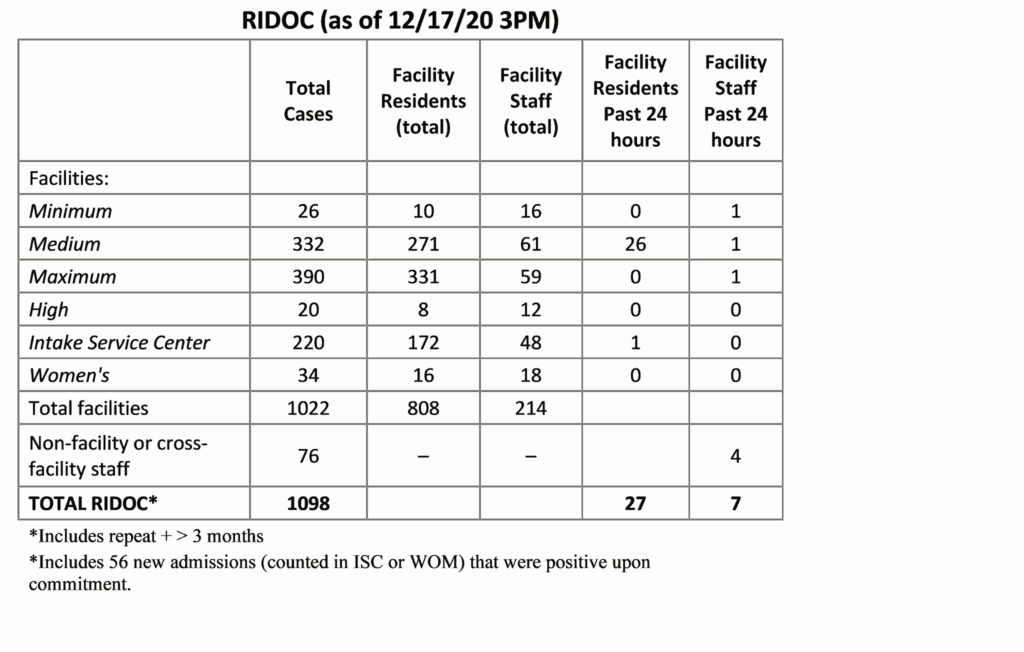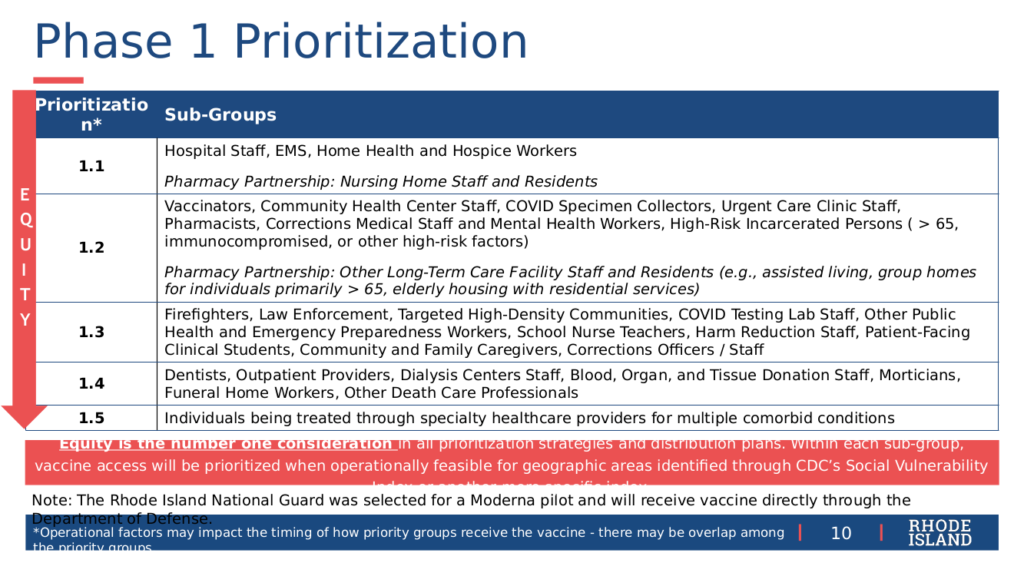The first inmate death due to COVID-19 at the RI Adult Correctional Institution (ACI) was confirmed today to Motif by the Department of Corrections (DoC), having occurred on Saturday, December 19. The deceased was a 66-year-old male “who had other complicating co-morbidities that likely contributed to his death [and] was at Rhode Island Hospital being treated for complications of COVID-19.”
The most recent weekly report published by DoC lists 1,098 total COVID-19 cases, of which 808 are among incarcerated persons and 290 among staff.

This inmate death follows the first COVID-19 staff death at the ACI on Monday, December 14. These two COVID-19 deaths are so far the only ones reported by DoC.
The DoC statement declined to fully identify the deceased: “Due to medical privacy laws the name of the individual is not being released.” All the DoC said in the statement by way of identification was that, prior to hospitalization, “The inmate was housed in the Maximum Security facility of the ACI since 1988, where he was serving life without parole for the sexual assault and resulting death of a 73-year-old double amputee woman.” That description, however, leaves little practical doubt that the deceased is Jeffrey Washington, whose situation was summarized in a July 2005 ruling by Judge Judith Colenback Savage of the Superior Court challenging “conviction after trial by jury in May 1989 for felony murder for his rape and the resulting death of Alice Carcieri, a 73-year-old double amputee, and his sentence, imposed by the Court upon the jury’s finding of aggravated battery, of life without the possibility of parole.”
The activist group Direct Action for Rights and Equality (DARE) late Saturday published a statement on their Facebook feed: “We just learned that a person incarcerated in the maximum security facility has passed away from COVID. There are really no words. This person’s life was taken by the state. This is a murder. His blood is on their hands: [RI Gov. Gina] Raimondo, [DoC Director Patricia A.] Coyne-Fague, [RI Department of Health Director Nicole] Alexander-Scott. We don’t know if he is one of our own loved ones and we are praying for his family. Until there is justice for our people, there will be no peace.”
In an earlier statement on December 9, DARE alleged that basic health measures against the virus were being ignored within the ACI: “From the beginning of the pandemic, over and over again, community members, public health experts, and organizers called on the Governor, [the Department of Health], [DoC], and the [attorney general] to take the recommended precautions. And yet we are currently watching as hundreds of our incarcerated community members – disproportionately Black, brown, and low-income people – have become infected and disease is rapidly spreading inside a place already notorious for abusive conditions and substandard healthcare.… There is no possible excuse for what has happened to our loved ones. They have been held in inhumanely restrictive conditions for nine months, with severely limited access to showers, phone calls, and time outside, without access to educational programming or video visitation with loved ones. We were told over and over again by [DoC] that these measures were necessary for their safety. Yet we continued to get reports long into the fall that the most basic recommended measures – such as providing prisoners with more than one mask and supplies to clean them – were not followed. We are now learning from family members that COs [correctional officers] are returning to work a week after testing positive. That COs do not consistently wear their masks in common spaces and around prisoners. That prisoners testing positive or still showing symptoms are grouped together and put back into units and cells with those who are healthy, and simply told to stay six feet apart.”
In the DoC statement announcing the inmate death, Director Patricia A. Coyne-Fague said, “It is clear that we must continue our efforts to mitigate the spread of COVID-19. Thanks to the hard work and dedication of our medical and security staff, we have not experienced the heartbreaking losses that other [departments of corrections] across the country have. However, this is a strong reminder as to why we must continue to wear our masks, get vaccinated, and follow our health safety protocols to keep everyone as safe as possible.”
At the regular meeting on Friday, December 18, the RI Department of Health Vaccine Sub-Committe adopted guidance for five subphases of Phase 1 of the RI vaccination priority groups, expected to take a minimum of three months. The second highest priority subphase 1.2 includes corrections staff working in physical and mental health, and also includes incarcerated persons at high-risk because they are immuno-compromised, 65 years of age or older, or other factors. The third highest priority subphase 1.3 includes all other correctional officers and staff. Most incarcerated persons are not on the priority list for vaccination at all.


